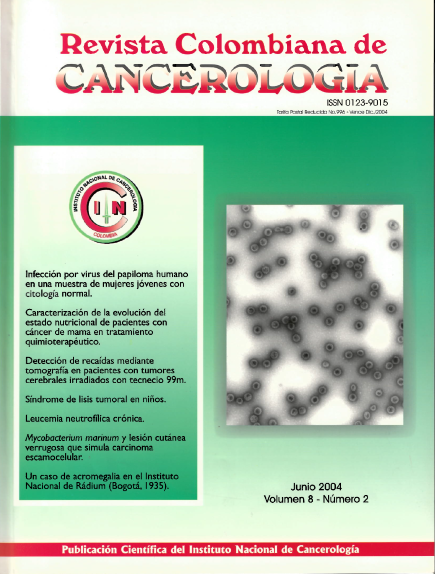Characterization of the evolution of the nutritional condition of patients with breast cancer on chemotherapy
Keywords:
Breast neoplasms, drug therapy, nutritional status, food consumptionAbstract
Introduction: breast cancer is common in women, and it is usually treated with chemotherapy. It has been asserted that this treatment affects nutritional condition because it produces a gastrointestinal symptomatology and modifies food consumption.
Objetive: characterize the nutritional condition in women with breast cancer treated with Adriamycin and Cyclophosphamide (AC).
Materials and methods: this study used a prospective, longitudinal design with 25 patients during three continuous cycles of chemotherapy. Food intake and anthropometric indicators of nutritional status were measured before the treatment and at the beginning of each cycle, and gastrointestinal effects were evaluated weekly.
Results: during chemotherapy the consumption of meats, desserts, and bakery products diminished, and piece size and consumption of cheese, fruits, and rice decreased. 40% of women had a normal weight and 40% were overweight before and during treatment. The most frequent gastrointestinal effects were xerostomia (61%) and nausea (55%). 56% of patients presented changes in smell and 47% in taste. The rejected foods were beef, fish, milk, and yogurt. There was a statistically significant association between alterations in smell and taste and food aversion but there was no association between aversions and decreased food intake.
Conclusions: the short-term treatment with Adryamicin and Cyclophosphamide did not produce changes in body weight during chemotherapy and, despite gastrointestinal effects, food intake was not affected in a significant way.
Author Biographies
Lilia Lancheros, Universidad Nacional de Colombia
Universidad Nacional de Colombia, Bogotá, D.C., Colombia, Departamento de Nutrición y Dietética
Magda Gamba, Universidad Nacional de Colombia
Universidad Nacional de Colombia, Bogotá, D.C., Colombia, Departamento de Nutrición y Dietética
Helena González, Universidad Nacional de Colombia
Universidad Nacional de Colombia, Bogotá, D.C., Colombia, Departamento de Nutrición y Dietética
Ricardo Sánchez, Universidad Nacional de Colombia
Universidad Nacional de Colombia, Bogotá, D.C., Colombia, Facultad de Medicina
References
Radice D, Redaelli A. Breast cancer management: quality of life and cost considerations. Pharmaco-economics 2003; 21(6): 383-396. https://doi.org/10.2165/00019053-200321060-00003
J. Ferlay, E Bray, P. Pisani and D.M. Parkin. GLOB OCAN 2000: Cancer Incidence, Mortality and Prevalence World wide, Version 1.0. IARC CancerBase No. 5. Lyon, IARC Press, 2001.
Friedewald V. Cáncer de Seno. Bogotá: Norma; 1997.
Díaz E, Conde-García J. Oncología Clínica Básica. Madrid: Aran Ediciones; 2000.
R Weiss G. Oncología Clínica. 1 ed. México D.F: Editorial el Manual Moderno;1997.
Skeel R. Quimioterapia del Cáncer. 5 ed. Madrid: Marbán Libros; 2000.
Gris J, Canillo F. Apoyo Nutricio en Cáncer. 1 ed. México: Editorial Interamericana Mc Graw-Hill; 1995.
Katleen M. Nutrición y Dietoterapia Krausse. 9 ed. México: Editorial McGraw-Hill; 1998.
Lindley CM, Bernard S, Fields SM. Incidence and duration of chemotherapy-induced nausea and vomiting in the outpatient oncology population. J Clin Oncol 1989; 7(8): 1142-9. https://doi.org/10.1200/JCO.1989.7.8.1142
De Boer-D ennert M, De Wit R, Schmitz PL, Djontono J, Berurden V, Stoter G et al. Patients perceptions of the side-effects of chemotherapy: the influence of 5HT3 antagonists. Br J Cancer 1997;76(8): 1055-61. https://doi.org/10.1038/bjc.1997.507
Fraschini G, Ciociola A, Esparza L, Templeton D, Holmes F, Walters R et al. Evaluation of three oral dosages of Ondansetron in the prevention of nausea and emesis associated with cyclophosphamide-doxorubicin chemotherapy. J Clin Oncol 1991; 9(7): 1268-74. https://doi.org/10.1200/JCO.1991.9.7.1268
Martin CG, Rubenstein EB, Elting LS, Jun-Kim YJ, Osoba D. Measuring chemotherapy-induced nausea and emesis. Cancer 2003; 98(3): 645-55. https://doi.org/10.1002/cncr.11540
Davies AN, Broadley K, Beighton D. Xerostomia in patients with advanced cancer. J Pain Symptom Manage 2001; 22(4): 820-5. https://doi.org/10.1016/S0885-3924(01)00318-9
Dodd M, Miaskowski C, Dibble S, Paul Steven, MacPhail L, Greenspan D et al. Factors Influencing Oral Mucositis in Patients Receiving Chemotherapy. Cancer Pract 2000; 8(6): 291-7. https://doi.org/10.1046/j.1523-5394.2000.86010.x
Epstein J, Tsang A, Warkentin D, Ship J. The role of salivary function in modulating chemotherapy-induced oropharyngeal mucositis: A review of literature. Oral Sur Oral Med Oral Pathol 2002; 94(1): 39.44.
Bast R. In: Stephen S. Edition. B.C.Decker inc. Cancer Medicine, 5th. Chapter 40. Complications of cancer and its treatment, 2000.
Paserot s, Pinhede AM, Maury P, Benhamouda A, Nizri D, et al Evaluation of sensitive alterations in cancer patients treated by chemotherapy: first report. Proceedings American Society of clinical Oncology 33th; 1997 May 17-20; Denuer, Colorado; 1997. P. 7 9 a.
Dewys WD, Walters K. Abnorm alities of taste sensation in cancer patients. Cancer 1975; 36(5): 1888-96.
https://doi.org/10.1002/1097-0142(197511)36:5<1888::AID-CNCR2820360546>3.0.CO;2-Y
Carson JA, Gormican A. Taste acuity and food attitudes of selected patients with cancer. J Am Diet Assoc 1977; 70(4): 361-5. https://doi.org/10.1016/S0002-8223(21)06450-6
Settle RG, Quinn MR, Brand JG, Kare MR, Mullen JL, Brown R et al. Gustatory evaluation of cancer patients: Preliminary results. En: Nutrition and Cancer. Procceedings of the 18th Annual Meeting of the American College of Nutrition held in Houston, June, 1997.
Demark-Wahnefried W, Hars V, Conaway MR, Havlin K, Rimer BK, McElveen G, Winer EP. Reduced rates Of Metabolism And Decreased Physical Activity In Breast Cancer Patients Receiving Adjuvant Chemotherapy. Am J Clin Nutr 1997; 65(5): 1495-501. https://doi.org/10.1093/ajcn/65.5.1495
Camoriano JK, Loprinzi CL, Ingle JN, TherneauTM , Krook JE, V eeder M H . Weight C hange InWomen Treated With Adjuvant Therapy OrObserved Following Mastectomy For Node-Positive Breast Cancer. J Clin Oncol 1990; 8(8): 1327-34. https://doi.org/10.1200/JCO.1990.8.8.1327
Demark-Wahnefiied W, .Rimer BK, Winer E. Weight gain in women diagnosed with breast cancer. J Am Diet Assoc 1997; 97(5): 519-26. https://doi.org/10.1016/S0002-8223(97)00133-8
Demark-Wahnefried W, Winer EP, Rimer BK. Why Women Gain Weight With Adjuvant Chemotherapy For B reast Cancer. J Clin Oncol 1993; 11(7); 1418-29.
Foltz AT. Weight gain among stagen breast cancer patients: a study of five factors. Oncol Nurs Forum 1985; 12(3): 21-6.
Heasman KZ, Sutherland HJ, Campbell J A, Elhakim T, Boyd N. Weight gain during adjuvant chemotherapy for breast cancer. Breast Cancer Res Treat - 1985; 5(2): 195-200. https://doi.org/10.1007/BF01805994
Mclnnes JA, Knobf MT. Weight gain and quality of life in women treated with adjuvant chemotherapy for early-stage breast cancer. Oncol Nurs For 2001;
(4): 675-84.28. Megale L, Spotti P, Giglio A. Weight changes du chemotherapy for breast cancer. Sao Paulo Me Journal 2002; 120: 113. https://doi.org/10.1590/S1516-31802002000400005
Goodwin PJ, Panzarella, T, Boyd NF. Weight j in women with localized breast cancer: A deserk study. Breast Cancer Res and Treat 1988; 59-66.
DeConti RC. Weight gain in the adjuvant chemo therapy of breast cancer. Proc Am Soc Clin Oncol 1982; 1:73.
Chlebowski RT, Weiner JM, Reynolds R, Luce J, Bulcavagel, Bateman JR. Longrterm survival following relapse after 5-FU but not cmf adjuvant breast cancer therapy. Breast Cancer Res Treat 1986; 7(1): 23-30. https://doi.org/10.1007/BF01886732
Fisher B, Brown AM, Dimitrov NV, Poisson R, Redmon C, Margolese RG, et al. Two months of Doxorubicin-Cyclophosphamide with and without interval reinduction therapy compared with 6 months of Cyclophosphamide, Methotrexate, and Fluoracil in positive-node breast cancer patients with Tamoxifen-nonresponsive tumors: Results from the National Surgical Adjuvant Breast and Bowel Project b-15. J Clin Oncol 1990; 8(9): 1483-96. https://doi.org/10.1200/JCO.1990.8.9.1483
Demark-Wahnefried W, Peterson B, Winer E, Marks L, Aziz N, Marcom PN et al. Changes in weight, body composition, and factors influencing energy balance among premenopausal breast cancer patients receiving adjuvant chemotherapy. J Clin Oncol 2001; 19(9): 2381-9. https://doi.org/10.1200/JCO.2001.19.9.2381
Kutynec CL, McCargar L, Barr SI, Hislop TG.Energy balance in women with breast cancer during adjuvant treatment. J Am Diet Assoc 1999; 99(10):1222-7. https://doi.org/10.1016/S0002-8223(99)00301-6
Demark-Wahnefried W, Peterson B, McBride C, Lipkus I, Clipp E. Current health behaviors and readiness to pursue life-style changes among men and women diagnosed with early stage prostate and breast cancer. Cancer 2000; 88(3): 674-84. https://doi.org/10.1002/(SICI)1097-0142(20000201)88:3<674::AID-CNCR26>3.0.CO;2-R
Salminen EK, Lagstron HK, Heikkla, Salminen SJ. Does breast cancer change patient's dietary habits? Eur J Clin Nutr 2000; 54: 844.
Salminen E, Heikkila S, Poussa T, Lagstrom H, Saario R, Salminen S. Female patients tend to alter their diet following the diagnosis of rheumatoid arthritis and breast cancer. Preventive Med 2002; 34:529. https://doi.org/10.1006/pmed.2002.1015
Thomson CA, Flatt SW, Rock CL, Ritenbaugh C, Newman V, Pierce JP. Increased fruit, vegetable and fiber intake and lower fat intake reported amongwomen previously treated for invasive breast cancer. J Am Diet Assoc 2002; 102(6): 801-8. https://doi.org/10.1016/S0002-8223(02)90180-X
Willet WC. Reproducibility and validity of a semiquantitative food frequency questionnaire. Am J Epidemiology 1985; 122: 151. https://doi.org/10.1093/oxfordjournals.aje.a114086
Jeliffe DB. Evaluación del estado de nutrición de la comunidad. Organización Mundial de la Salud, Serie de Monografías No. 53; 1968.
Instituto Colombiano de la Juventud y el Deporte (COLDEPORTES). Protocolo de antropometría; 1998.
Berste in IL. Physiological and psychologicalm echanisms of cancer anorexia. Cancer R es 1982;42(2 suppl): 7152-720s.
Dewys W, Hillenbrand H. Oral feeding in the nutritional management of the cancer patient. Cancer Research 1977; 37: 429.
Nielsen SS, Theologides A, Vickers ZM, Influence of food odors on food aversions and preferences in patients with cancer. Am J Clin Nutr 1980; 33(11): 2253-61. https://doi.org/10.1093/ajcn/33.11.2253
Jacobsen PB, Bovbjerg DH, Schwartz MD,Andrykowski MA, Futterman AD, Gilewski T et al. Formation of food aversions in cancer patientsreceiving repeated infusions of chemotherapy. Behav Res Ther 1993; 31 (8): 739-48. https://doi.org/10.1016/0005-7967(93)90004-E
Mattes RD, Arnold C, Boraas M. Learned food aversions among cancer chemotherapy patients. Incidence, nature and clinical implications. Cancer 1987; 60(10): 2576-80. https://doi.org/10.1002/1097-0142(19871115)60:10<2576::AID-CNCR2820601038>3.0.CO;2-5
. Brewin T. Can a tumor cause the same appetite perversion or taste change as a pregnancy? The Lancet 1980; 2(8200): 907-8.
Grindel C, Cahill C, Walker M. Food intake in women with breast cancer during their first six months of chemotherapy. Oncol Nurs Forum 1989; 16(3): 401-7.
Griffin AM. Batow PN, Coates AS, Childs AN, Ellis PN, et al. On the receiving end. v: patient perceptions of the side effects of chemotherapy in 1993. Ann Oncol 1996; 7(2): 189-95. https://doi.org/10.1093/oxfordjournals.annonc.a010548
Griffin AM, Butow PN, Coates AS, Childs AM, Ellis PM, Dunn SM, Tattersall MH. On the receiving end. v: Patient perceptions of the side effects of cancer che motherapy in 1993. Ann Oncol 1996; 7(2): 189-95. https://doi.org/10.1093/oxfordjournals.annonc.a010548
Knobf MT. Symptoms and rehabilitation needs of patients with early stage breast cancer during primary therapy. Cancer 1990; 66(6suppl): 1392-401.
Bonnadona G, Valagussa P, Rossi A, Tancini G, Brambilla C. A ten year experience with CMF-based adjuvant chemotherapy in resectable breast cancer. Breast Cancer Res and Treat 1985; 5(2): 95-115. https://doi.org/10.1007/BF01805984
Schwartz AL. Exercise and weight gain in breast cancer patients receiving chemotherapy. Cancer Pract. 2000; 8(5): 231-7.22Revist a Col ombianade Cancerología 2004; 8(2): 11-22
How to Cite
Downloads
Downloads
Published
Issue
Section
License
Todos los derechos reservados.




